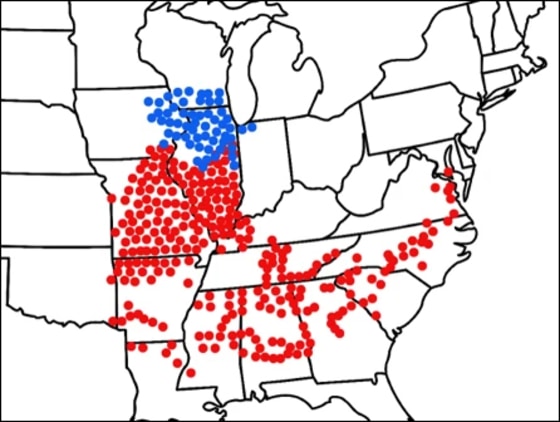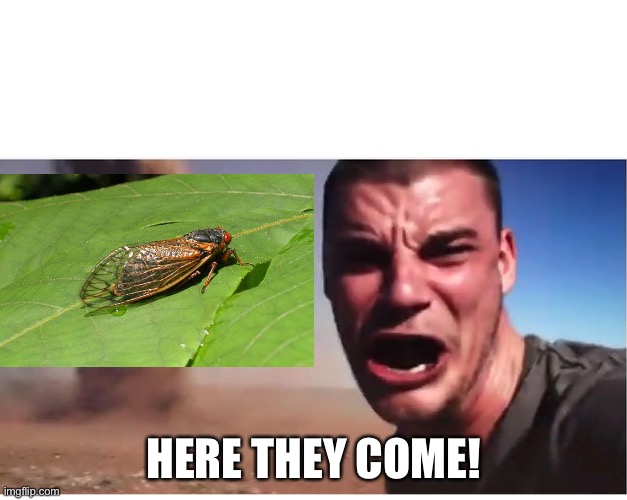
Posted on 01/22/2024 9:44:58 AM PST by Red Badger
It’s official: 2024 belongs to the cicadas.
This spring, two different broods of cicadas — one that lives on a 13-year cycle and the other that lives on a 17-year cycle — will emerge at the same time from underground in a rare, synchronized event that last occurred in 1803.
Billions of the winged insects will make an appearance across the Midwest and the Southeast, beginning in some places in late April, for a raucous mating ritual that tends to inspire fascination and annoyance in equal measure.
This year’s dual emergence is a once-in-a-lifetime event. While any given 13-year brood and 17-year brood can occasionally emerge at the same time, each specific pair will see their cycles aligned only once every 221 years. What’s more, this year’s cicada groups, known as Brood XIII and Brood XIX, happened to make their homes adjacent to one another, with a narrow overlap in central Illinois.
“Thomas Jefferson was president the last time these two broods came out, so is it rare? Yes,” said Gene Kritsky, an entomologist at Mount St. Joseph University in Cincinnati and author of “A Tale of Two Broods,” a book about this year’s dual emergence that was published earlier this month.
After 2024, Brood XIII and Brood XIX cicadas won’t sync up their emergences again for another 221 years.
These types of cicadas are periodical insects that spend most of their lives underground feeding on tree roots. After 13 years or 17 years, depending on their brood, the cicadas will tunnel to the surface to reach maturity and engage in a monthlong, noisy search for a mate.
Cicadas typically surface in the spring once soil reaches a temperature of around 64 degrees Fahrenheit.

The blue map dots denote Brood XIII cicadas and the red dots are areas where Brood XIX has emerged in the past. These areas will likely have periodical cicadas in 2024.Cicada Safari
Brood XIII cicadas appear in the Midwest, mostly centered in Illinois but also stretching into Wisconsin, Ohio and Iowa. Brood XIX cicadas have been spotted over a much larger geographic area that includes Missouri, Illinois, Louisiana, North Carolina, Virginia and Maryland.
When these insects emerge, they do so in big numbers. And they're not exactly quiet in their mating frenzy.
The insects are known to emit a high-pitched buzz, or mating song, that can reach up to 100 decibels — roughly equivalent to a motorcycle or jackhammer.

Get the grill ready....
Cicada burgers!........................
Didn’t this just happpen recently?
Noooooo!!!!!!
Different broods emerge in different years....................
This pleases the ‘One Worlders’ to no end; plenty of bugs for we Proletariat to eat!
Ugh. I hate these bugs - ALMOST as much as I hate Grasshoppers. Almost.
OK. But the fact that there will more than usual isn’t so rare.
When I was a kid, they came out in north Mississippi. Every day for a month there was solid noise.................
And thousands of enviro-wackos are getting their outdoor rotisseries ready and are going to have a feast! Roasted salted cicada.
Give me a double Cicada burger and fries.
I love the sound of cicadas. It is the sound of summer for me. Takes me back to carefree summer vacation from school.
Wasn’t there something in the bible about plagues and pestilence, I seem to remember it toward the end of the bible in Revelations or something.
Oh, joy. The noise will be...interesting.
When I was little, people referred to the cicadas as locusts.
Cicada adults don’t feed. They just make noise and breed.
I’m going to research to see if they’re edible.
Dang Global warming!
/sarc
Then why is the 17 year brood called Brood XIX?
Disclaimer: Opinions posted on Free Republic are those of the individual posters and do not necessarily represent the opinion of Free Republic or its management. All materials posted herein are protected by copyright law and the exemption for fair use of copyrighted works.